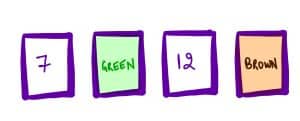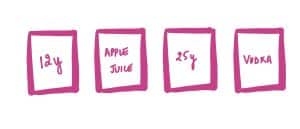Hey, hi! Let’s see how good your logical skills are, shall we?
Here’s a set of 4 cards:
 I make a claim that “odd numbered cards can only have a primary color (red, green, blue) on their flip side”. Which 2 cards would you flip to check the trueness of my claim?
I make a claim that “odd numbered cards can only have a primary color (red, green, blue) on their flip side”. Which 2 cards would you flip to check the trueness of my claim?
.
If you had a hard time coming to an answer or maybe did not even get one, do not beat yourself over it. Your brain was not really designed to solve such logical questions.
Let me reword the question though, and let’s try again.
I now say “people less than 18 years of age can only have non-alcoholic drinks”, and present to you with the following set of cards with ages written on one side and their drink choice written on the other-

Which of these cards would you now flip to make sure that the rule isn’t broken?
This seems pretty obvious, right? Most people correctly answer that they’ll flip cards ‘12yrs’ and ‘Vodka’.
It would be interesting to note that the 2 questions I posed to you are essentially equivalent to each other. The answer to the first puzzle is flipping the cards ‘7’ and ‘Brown’.
And yet, even if you did ultimately crack the first puzzle, it took considerably more time to reason it out than the second one. Why is that so, when the question is the exact same?
These cards here represent the Wason Selection Task, designed by Peter Cathcart Wason in 1966, and as illustrated, the original task, involving just numbers and colors, stumps most people. It appears that our brain circuitry is not developed to tackle such questions, because they seem to have little relevant significance in our survival.
However, interestingly, the moment you put it in the context of a social setting like the latter example, it makes almost intuitive sense. Even though the task is the exact same, it is multitudes easier for us to wrap our heads around it, possibly because the context, the ‘why’ behind the task makes all the difference for our brains.
I’ll share another example, this one from personal experience.
As a new intern doctor, there are a lot of practical skills to be learnt. My senior once told me to administer a bladder wash to a patient, and he started enlisting the steps- “Take half a litre saline, put 10ml betadine to it, then connect it to the foley’s catheter for 10 mins, then disconnect and clip it and let it stay for 30 mins…..”
I was completely flustered. Nothing made sense to me. I just stood there with a dumb look on my face, and it must have been pretty evident, because another senior (bless his soul) started explaining to me again- “See, the patient has a bladder infection, so we want to fill up the bladder with betadine wash. So you take a 500ml NS bottle, and inject 10ml betadine to it. Then you take this wash and connect it to the Foley’s catheter and let it fill the bladder. Then we want the wash to stay inside the bladder for some time, so we need to clip the urobag so that the wash doesn’t flow back. You can clip using a syringe and removing its plunger…..”
And that is when it all made perfect sense to me. Understanding the ‘why’ of whatever I was supposed to do just naturally made following instructions easier.
The next time I did not really need to think about the process in such detail, I could enlist the steps without any trouble. But understanding the reason behind the process the first time was essential for burning that memory in.
And so it goes with any new things we learn, be it a new subject or a skill. The ‘why’ is definitely the most important question to ask and the ‘how, when, where…’ follow automatically.
That is not all though; the importance of the ‘why’ extends to a much more macroscopic level as well.
So many of us find ourselves slogging through a routine we hate, day after day, never asking why we are actually putting ourselves through it. We make choices in life, not because we are driven towards them, but because of some external factors, like societal expectations. The lack of a strong enough drive to pursue what we are ‘supposed to’ is the reason for misery for so many of us.
And this is not just self-help cliché, this is well-studied neural circuitry. I have talked about dopamine on this platform before (read here) – it is the chemical responsible for our motivation to act the way we do, to pursue the things we pursue.
Every time we think of performing a task, the difference between us actually following through on that thought or not is the amount of the dopamine released (more precisely the height of the dopamine peak attained) in our brains that makes us get out of our bed and actively pursue any given result.
If there are tasks you know you should be doing, like getting started on a presentation or going to the gym, but you just cannot get yourself to do it, then one solution is to pause, take a step back, and first ask the question- why do I want to do this thing in the first place? And then, as answers pop up in your mind, repeat the question again, going deeper and deeper into your true motivations.
Spending some time thinking about the ‘why’ might actually lead you to insights you never had before. On the surface, it might seem that you want to go to the gym because you want to lose weight, but as you keep asking yourself why it matters so much, you might realise a deep sense of wanting achievement, wanting to feel seen and connected or simply wanting to be more in control of your life and health.
Whatever those whys are, if they are strong enough for you, they will drive you to action. At the least, they will make getting out of your comfort zone seem not as awful as before.
Consciously thinking about our reasons for wanting something causes a dopamine peak, followed by a dopamine fall in the brain. And that fall of dopamine or dopamine scarcity in the brain drives us to act on our thought, in an attempt to replenish the dopamine pool again (I’ll explain this machinery in greater detail in a future post). So when you have a stronger desire for something, the dopamine peak and fall are proportionately larger, making not fulfilling that desire more miserable than getting out of bed and working towards it.
Add to that the fact that humans are remarkably resilient. We often underestimate our own capacity to stand in the face of adversity. Imagining ourselves in worst case scenarios, like failing exams, or losing our jobs, or going bankrupt, feels like a life-and-death situation, unless we actually go through those things, and end up not just surviving, but a lot of times, thriving through those calamities. We cannot fathom how things would work out in dire circumstances, but, when faced with them, given strong enough desire to persist, things do work out.
If we have the why figured out, the how takes care of itself.
Be it for something as little as giving a patient bladder wash, or deciding what you want to do with your life, focusing on the why makes all the difference.


4 Comments
Dr Sarthak Kaushik · May 15, 2023 at 7:56 am
Beautifully written and explained 👏🏼
Mridula · May 15, 2023 at 8:09 am
Thanks!!!
Aakash · December 16, 2024 at 5:39 pm
Very simple yet beautifully written, which somehow I guess everyone knows, but at the same time, everyone sort of needs to be reminded. Great work!
Mridula · June 23, 2025 at 4:28 pm
Appreciate it, thanks!